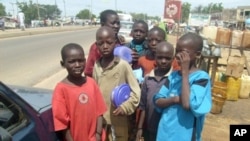Child trafficking has grown into a high-profit business in some of Nigeria's poor areas, particularly in parts of the southeast, according to non-governmental organizations. Orphanage workers and operators of illegal hospitals and maternity homes are said to be guilty of selling children. Some children are sold for adoption by childless couples and others trained as beggars or prostitutes. The matron of an orphanage in Awka, in Anambra state, Christy Anyachubalu, tells VOA what she knows about child trafficking in her home region.
"Some women are eager to traffick babies," she said. "They want to get money. They tell mothers at home that they are taking their babies to go to school or doing something… And come see that woman letting the baby beg for her. There is one that was brought here. She had [a] wound on the leg and the woman inflicted the wound. And they carried the baby with barrow and bring her outside to beg. And there is another woman, they sell the babies to her and she trafficks them."
Some health workers, including doctors and nurses, allegedly sell newborns after telling mothers their babies had died. In some instances, the infants were unwanted babies like those born out of wedlock. According to local newspaper reports, the price of a baby varies between $2000 and $3000.
Anambra state commissioner for women's affairs, Ego Uzoezie, says orphanages in the state are being monitored in an ongoing crackdown against the buying and selling of babies.
"We are not leaving anybody found guilty of child trafficking out of being punished," he said. "And also we equally do monitoring exercise and supervision, supervising homes, monitoring homes. Because really if you are not supervising, if you are not monitoring, a lot of things could go in the wrong way. So we have social welfare officers who are involved. So we are on ground to stop any illegality surrounding adoption procedures. We are closing homes that are not registered."
Although Nigeria passed anti-trafficking legislation in 2003 to deal with growing cases of trafficking, convictions against human traffickers remain rare.
News
Nigeria Campaigns Against Infant Traffickers
update

Nigeria's human trafficking agency says thousands of children go missing each year in Africa's most populous nation, often victims of traffickers.



